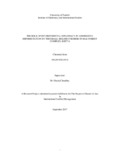| dc.contributor.author | Chemutai, Irene | |
| dc.date.accessioned | 2018-01-04T06:11:52Z | |
| dc.date.available | 2018-01-04T06:11:52Z | |
| dc.date.issued | 2017 | |
| dc.identifier.uri | http://hdl.handle.net/11295/102162 | |
| dc.description.abstract | With the increase in population growth there has been spiralling demand for land for plantations and other forms of agriculture. Conversion of forest to agriculture, industrialization and the spread of infrastructure have collectively been identified as principal drivers of deforestation by most forest conservation workshops. The review of the literature suggests imminent human activities have led to deforestation and forest degradation. Mau forest being one of the largest forests in Kenya had been the center of attention due to the continuous encroachment of the forest land by the communities around the forest. The general objective of the study therefore was to establish the causes and impacts of deforestation by small holder farmers in Mau forest, to determine the environmental effects of deforestation by small-holder farmers in Mau forest and to establish the role of environmental diplomacy on reducing deforestation by small holder farmers in Mau forest. The study is anchored on Neo-Malthusian Theory and Scarcity Theory. The study used descriptive research design. The target population of the study was 3 Kenya Forest Service Managers from each of the 3 forest stations and 164 small-holder farmers in the Mau Forest. Interview guide and semi-structured questionnaires were the research instruments used to collect primary data. Descriptive statistics including measures of central tendency and dispersion were used to analyses the data. In addition, regression analysis was used to study the relationship between deforestation of Mau forest by small holders’ farmers and environmental influences. Results were presented using tables. The findings of the study revealed that majority of the people living around Mau forest lack proper education which limits their ability to acquire employable skills to be employed in other sectors of the economy other than depending on the forest and its resources for their livelihood. Deforestation was found to have major effect on ecosystem by slowly turning the tropical zones into deserts, depletion of water resources, leads to climatic change that affect agricultural by lowering the yields and the gross domestic product of the country. In addition, environmental diplomacy was found to have significant effect on reducing deforestation by small holder farmers. The study recommends that on creating awareness to the small-holder farmers on the devastating effects of deforestation as well as trains them on better farming practices that will not lead to encroachment of forest land. The government also need to fast track on land reform policies to ensure that those living around Mau forest are resettled soonest possible. Further all the relevant ministries should embark on environmental diplomacy as a strategy to curb deforestation by people living around Mau forest. The study suggests that future researcher should focus on challenges affecting environmental diplomacy approach as a means of curbing deforestation in Mau forest. | en_US |
| dc.language.iso | en | en_US |
| dc.publisher | University of Nairobi | en_US |
| dc.rights | Attribution-NonCommercial-NoDerivs 3.0 United States | * |
| dc.rights.uri | http://creativecommons.org/licenses/by-nc-nd/3.0/us/ | * |
| dc.subject | The Role of Environmental Diplomacy in Addressing Deforestation by the Small Holder Farmers | en_US |
| dc.title | The Role of Environmental Diplomacy in Addressing Deforestation by the Small Holder Farmers in Mau Forest Complex, Kenya | en_US |
| dc.type | Thesis | en_US |



